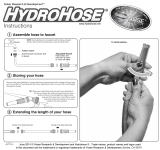
UsingthesoaPinjector
Your pressure washer is supplied with a downstream low pressure
soap/chemical injector. Soap is added after the water flows through
the pump. The injector is used to add liquids to the water. The
injector works only on low pressure.
To draw soap/chemical into the pressure washer, insert the filter end
of the pick-up hose into the soap/chemical. Adjust the nozzle to the
low pressure position. Do not use powders, granulars, high viscosity
detergents or acidic based detergents/chemicals in the injector.
To shutdown the injector, remove pick up tube and filter from
detergent/chemical tank and place it in a container of clear water.
Run water through the entire system to wash out the chemical you
were using.
storingthePressUreWasher
Severe damage could occur by water freezing inside the components.
To prevent costly repairs, follow these steps:
1. Make sure the unit is “OFF”, water supply is disconnected and
system pressure has been relieved.
2. Install a suction hose from the pump inlet (garden hose fitting)
into a gallon of NON-TOXIC RV anti-freeze. Following operating
instructions start the machine and squeeze trigger on the spray
gun allowing the pump to draw anti-freeze through the entire
system. Once the anti-freeze appears at the end of the wand,
turn the machine “OFF”.
3. Squeeze gun trigger to relieve pressure from system. Disconnect
the high pressure hose from the high pressure outlet and put the
hose, gun/wand and owners manual in a secure place to prevent
unauthorized people from using the machine.
4. When preparing to use the pressure washer again, simply
reconnect the high pressure hose assembly and water supply to
the unit, turn the water on and squeeze the trigger on the spray
gun to send water through the system. Dispose of the anti-
freeze/water solution safely where it will not be harmful to the
environment, people or animals.
startingtheMachineafteraPeriodofnon-Use
Long periods of non-use can cause calcium and iron deposits inside
the pump. Starting the machine could cause damage to the pump.
Insert the allen key provided with the unit through the hole in the
motor end housing and rotate the motor one revolution clockwise
and counter-clockwise. Remove the key and start the motor. It
should start up easily.
Maintenance
Change oil after the first 50 hours of use. Use a SAE20 or 30 non-
detergent oil. After that, change oil every 200 hours, once a year
or when it looks milky, more frequently if used in demanding
environments. Changing oil is one of the most important and least
expensive maintenance items, it will prolong the life of your pressure
washer.
roUtinechecks–dotheseBeforeeveryUse.
1. Check water inlet screens for signs of debris.
2. Check nozzle for debris and signs of extensive wear. Worn
nozzle will result in poor performance. Only check nozzle with
the motor turned “OFF” and the pressure relieved from the
system!
3. Check all fittings and connections for leaks and worn areas.










